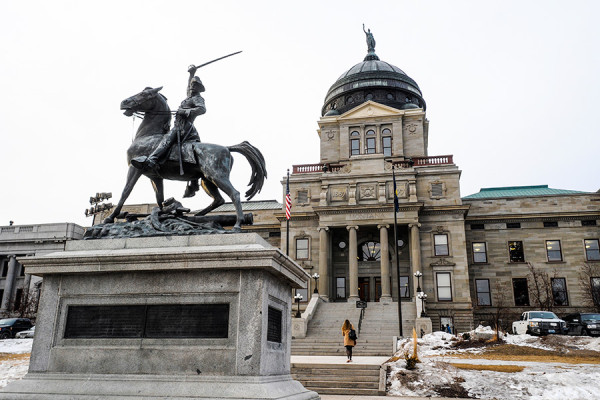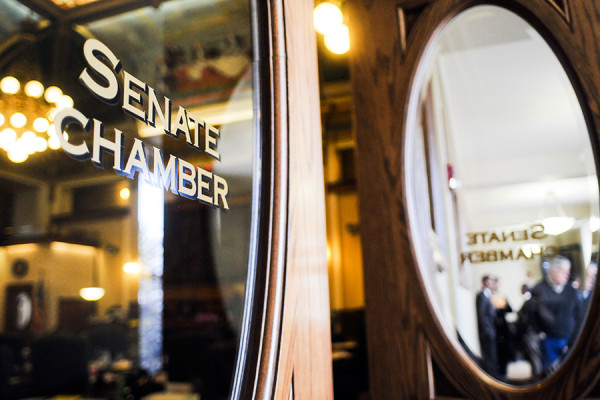Who’s Pulling the Strings?
As out-of-state interest groups mount a growing front around the 2015 Montana Legislature, both on the ground and within the walls of the statehouse, outside influence is playing into state politics at an unprecedented rate
By Tristan Scott
On Feb. 5, when 100 Flathead Valley residents crowded into a conference room at a Kalispell hotel, the head of the Montana branch of Americans for Prosperity was gearing up to make the same, carbon-copied pitch against Medicaid expansion that the group has been peddling across the nation.
Instead, the town hall meeting – advertised through a flurry of attack flyers targeting Rep. Frank Garner, R-Kalispell – lurched into a tailspin as residents mostly ignored the anti-Medicaid presentation and stood up in loud defense of the local lawmaker, questioning why the group had singled him out.
Garner, the former Kalispell police chief and the lone legislator in attendance, had driven four hours from Helena to defend his stance on Medicaid reform, despite not having received an invite to the meeting, and asked why, if the group’s intent was to influence state policy, had they taken aim at him through a blitz of attack mailers rather than simply ask him to the table.
The reason, explained Zach Lahn, state director for the Montana chapter of Americans for Prosperity (AFP), is that Garner refused to sign the group’s blanket pledge card in opposition to Medicaid expansion under the Affordable Care Act, or Obamacare, a stunt the group had performed on other Republican lawmakers whose views on Medicaid reform didn’t align with the hard-right faction.
Over the course of the previous week, Lahn and AFP had covered the state organizing similar town hall meetings, advertised through identical mailers, in other legislative districts in which Republican lawmakers had refused to sign the blanket pledges – not in an effort to skewer the politicians, he said, but to “educate voters” in hopes they would contact their legislators and encourage them to vote against Medicaid expansion.
“This is not a dig at Frank Garner. This is not and will not be a crusade against any legislator,” Lahn explained. “This is a crusade against bad policy.”

That explanation fell on deaf ears, and while no one in the room gushed over Medicaid expansion, and some spoke out in firm opposition to Obamacare, the crowd, with few exceptions, was uniformly dubious of AFP’s purpose in Montana, a state characterized by its streak of rugged individualism, a safe-harbor from the overreach of Washington politics and its climate of outside influence.
Still, the failure of AFP’s effort to lambast Garner and Medicaid expansion at the Kalispell rally has not deterred the group from conducting a full-court press in Montana, where it has expanded its reach and continues to organize town hall meetings across the state. The group recently announced the launch of a “major new initiative educating voters on why Medicaid expansion is wrong for Montana,” taking to the radio, mailing more flyers – the mailers picture a legislator’s visage superimposed over an image of President Barack Obama – and holding “teletownhalls” to promote its agenda.
Though the election season is over, a new kind of campaign is well underway in Montana over issues like Medicaid expansion, which has endured a torrent of outside influence.
And just as AFP ramps up its issue-advocacy based ground campaign to influence voters on the pitfalls of Medicaid expansion and the merits of a brand of health care that would apply to fewer low-income residents, it is also gaining traction within the halls of the statehouse, where some lawmakers are adopting its model legislation in lockstep and introducing the measures verbatim.
“I think they are running one of the best voter-outreach programs I have ever seen without ever revealing who is actually running their agenda,” Rep. Rob Cook, R-Conrad, said. “There is a duplicity in their behavior. On the one hand they want to pretend they are for the betterment of Montana, but on the other hand they are not from Montana and neither is their money. The level at which they are trying to deploy their ground-game is unprecedented, and it’s clear that there is an abundance of external money funding these folks. And because it’s AFP, we have a good idea who is funding this thing.”
AFP-Montana is a branch of the national conservative organization founded by the billionaire Koch brothers, David and Charles, who own Koch Industries, of Wichita, Kansas, and are prominent opponents of Medicaid expansion. An examination by the Center for Responsive Politics and the Washington Post found that the Kochs’ political groups raised more than $400 million for various political causes during the 2012 election, and efforts to kill Medicaid expansion have risen to the fore of their agenda.
The Kochs’ labyrinthine network of political groups and funding sources include innocuous names like the Freedom Partners Chamber of Commerce, the Center to Protect Patient Rights, Generation Opportunity, and Americans for Prosperity.
“They could call it ‘Americans for Babies’ and still push the same agenda,” Cook said. “If they had to disclose to Montanans the sources of their money they would be instantly relegated to the dustpan of history.”
Last summer, AFP built up its presence in Montana, expanding from two to 11 paid staffers, according to the group – nearly three times the size of the state’s most influential lobbying groups – and opened three new field offices in Billings, Bozeman and Missoula.
In Montana and elsewhere, AFP has partnered with the Florida-based conservative think tank Foundation for Government Accountability (FGA), an affiliate of the State Policy Network (SPN), a web of right-wing think tanks, to push a host of anti-Medicaid expansion bills, formulating and exporting policies to states without the level of disclosure typically required of lobbying. At the AFP event in Kalispell and other Montana districts, Kristina Ribali, senior coalitions director at the FGA, laid out the AFP’s case against Medicaid expansion in a Power Point presentation by drawing parallels to Obamacare and detailing its drawbacks.
The success of AFP’s efforts to mount a campaign in Montana, and that the FGA has found purchase with some lawmakers in the Treasure State, is reflective of the Republican majority’s disdain for Democratic Gov. Steve Bullock’s proposal to use $683 million in federal funds over the next biennium to provide health insurance to an additional 70,000 low-income Montana residents.
Architects of the GOP’s Medicaid reform proposal, a package of nearly 20 measures, have been working alongside the FGA to craft legislation as part of the Big Sky Health Plan, the GOP alternative to Medicaid expansion. The plan would expand government coverage for some poor Montanans, fund more local mental-health programs, limit liability for medical providers, and encourage market-based solutions for health coverage.

Emails between Republican legislators sponsoring the plan, legislative bill drafters and senior fellows with the FGA show the lawmakers taking direction from FGA on a number of proposals, including concepts and principles the group has promoted in other states like Florida, Maine, Kansas, and Georgia.
Sen. Fred Thomas, R-Stevensville, a sponsor of one of the major proposals, said FGA’s counsel on Medicaid reform has been immensely helpful for citizen legislators hammering out a complex issue, and he sees no impropriety in incorporating their ideas and expertise into Montana initiatives.
“It has been extremely helpful to have their assistance and data to educate us on Medicaid, food stamps, and other public projects,” Thomas said. “They might be headquartered somewhere else, but their expertise is relevant here.”
Some of the bills introduced as part of the GOP plan are the result of model legislation circulated by the FGA, including measures to limit eligibility to federally assisted welfare programs and to reform Medicaid by turning to “managed care,” like Florida has done.
In at least one instance, portions of a bill introduced in the Montana Legislature, SB 148, which aims to prevent welfare fraud, are taken nearly verbatim from a piece of model legislation by the American Legislative Exchange Council, a nonprofit organization of conservative state legislators and private sector representatives that drafts and shares model state-level legislation for broad distribution.
Meanwhile, moderate Republicans in the House and Senate are working on a compromise bill that would expand health insurance coverage to low income Montanans, but would also include tort reform and other measures important to Republicans.
But AFP is opposed to any plan that accepts any federal dollars to extend health care coverage to what Lahn refers to as “a brand new entitlement class of able-bodied, childless adults,” and the group has targeted lawmakers like Garner because of their willingness to even consider a compromise bill.
Garner said his allegiance is to the Montana voters who elected him, not AFP, and refuses to make up his mind on any measure until it’s fully developed and ready for consideration.
“Sure, I have problems with full expansion, but you can’t know what a bill looks like and does until it’s in front of you,” Garner said. “I won’t sign a pledge card for or against any issue.”
And in the 64th session of the Montana Legislature, there is no shortage of issues receiving support or opposition from groups with ties to outside funding and influence.

Sen. Chas Vincent, R-Libby, recently introduced SB 262, the controversial water rights accord with the Confederated Salish and Kootenai Tribes that is more than 15 years in the making.
Vincent opposed the compact when it was presented to the 2013 Legislature, but in the past two years, he and others worked to address the concerns of irrigators and tribal members alike, and he now stands among its strongest advocates.
But a “campaign of misinformation” has inundated the Capitol halls this session, and despite his best efforts – Vincent distributed a detailed packet to all 150 Montana legislators explaining the finer points of how the water compact works and the consequences if it fails – he can’t seem to break through the impenetrable wall of prevarication that has obscured the compact at the hands of out-of-state groups.
“As the sponsor of the bill, and having spent so much time on it, I can’t tell you how frustrating it is to see copious amounts of misinformation coming from these groups who have sprung up strictly as the result of compact negotiations over the past couple of years,” Vincent said. “I am hopeful that in the end, lawmakers are not going to listen to the individuals who are not even residents of Montana, people who are sending emails and YouTube videos and flyers. That is not how you have good policy discussion. You have good policy discussion by addressing the facts, and that’s what I’ve been doing until I’m blue in the face.”
Sen. Bruce Tutvedt, R-Kalispell, said he’s been personally attacked for advocating the compact’s ratification, and was even censured by the Flathead County Republican Committee for allegedly raising money to oppose hardline conservatives who oppose the compact.
Although Tutvedt dismissed the censure as meritless, he can’t ignore the rising tide of outside influence on the Montana Legislature, particularly as advocacy groups take aim at Medicaid expansion and the water compact.
“There has never been this level of outside money where they hire these so-called experts to obscure the issues,” Tutvedt said. “I have never seen this level of dark money where you don’t know where it’s coming from. We are seeing it with the compact, with Medicare and Medicaid, it just keeps churning. And we don’t know where that money is coming from. It’s dark. Nobody knows who is paying them.”
On the other side of the compact debate, critics point out that a group called Farmers and Ranchers for Montana, a pro-compact coalition, has hired a high-profile, Washington, D.C.-based public relations firm to cast its own spin over the compact.
While perhaps the most glaring, the current session isn’t the first time that outside influence and so-called “dark money” has reared its head.
Sandy Welch, organizer of an initiative to rein in dark money, is working on a bill with Republican state Sen. Duane Ankney to require all political organizations to fully disclose who’s donating money to their groups and how they are spending it on campaigns. But the bill would only apply to donors making contributions during an election cycle, and the level of dark money influencing the Legislature while it’s in session is a relatively new phenomenon, Welch said, and one not subject to disclosure under electioneering laws.
“We have never seen this kind of behavior during the session. It’s a new game,” the Martin City resident said. “The mailers and everything are completely unregulated. This is defined as issue advocacy and everybody has the right to promote their ideas.”
Anthony Johnstone, a professor of constitutional and election law at the University of Montana, said there’s a distinction between what triggers disclosure in instances of issue advocacy, such as AFP’s flyers, and what triggers disclosure in more traditional forms of lobbying.
Other newer examples, such as ALEC, the model-legislation organization, don’t participate in the same disclosure system as lobbying groups. One of the biggest questions raised by ALEC critics is whether the group’s actions legally constitute lobbying activity, even though, as a nonprofit, ALEC hasn’t registered or disclosed any lobbying expenditures with the Internal Revenue Service.
“That deprives not just voters but other legislators from knowing whether there are hidden agendas driven by major funders of front groups,” Johnstone said.

In American state politics, there is a long tradition of reform groups promoting policy innovation and helping states adopt legislative policies – groups like the National Conference of State Legislatures and the American Law Institute.
But ALEC appears to be a departure from those groups, Johnstone said, and has come under fire for its lack of transparency.
“The reputable law reform groups have no partisan or ideological connection. They are open to every state legislator, they don’t have corporate members and everything they do is public and disclosed,” Johnstone said. “ALEC is a departure from that tradition of transparent, non-partisan or bipartisan law reform movements. It is a new model. And in all the states in which it operates there are questions about whether it falls within the definition of lobbying because, unlike the traditional law reform model that is based on nonpartisan, disinterested expertise, ALEC’s model is built around bringing special interests literally to the same table as state legislators to formulate policy and export that policy to the states without the same level of disclosure.”
Ties between ALEC and the FGA, the group promoting an anti-Medicaid agenda across the country, came to light in 2013 when the watchdog group Center for Media and Democracy’s open records lawsuit against ALEC revealed evidence that lobbyists and special interest groups were driving its agenda rather than state legislators.
Specifically, the lawsuit showed coordination between FGA vice president Christie Herrera – previously the director of Health and Human Services for ALEC – and Wisconsin state Sen. Leah Vukmir, who worked in tandem to pass a resolution opposing Medicaid expansion. Herrera even went so far as to write scripts for legislators to parrot when they introduced the anti-Medicaid resolutions.
Herrera is also one of the FGA’s senior fellows who has provided assistance to Montana’s legislators in crafting the GOP’s Medicaid reform plan, including an FGA instructional article on how to draft reform measures for the federal Supplemental Nutritional Assistance Program (SNAP), titled, “It’s a SNAP: Model Language for Food Stamp Reform.”
But Thomas, the Stevensville senator working to revise Medicaid laws, said he reached out to FGA for help, not the other way around, and made his own revisions to some of their suggestions rather than accepting it as gospel.
“I contacted them (FGA) seeking their help dealing with health care issues revolving around Medicaid, and they were absolutely wonderful,” he said. “This was not some cookie-cutter deal to take another state’s resolution and bring it to Montana. It’s about what’s best for Montanans.”
Rob Cook, the senator from Conrad, said there’s nothing unusual about seeking expertise from outside groups, but not all are created equal. Last session, he and other lawmakers brought in outside experts from the reputable PEW Charitable Trusts to help draft a bill on pension reform.
“We used those folks in a more-or-less bipartisan matter as a resource for both sides, and I thought it went pretty well,” he said. “There are plenty of organizations out there that are reputable and useful and want to do right, and they aren’t funded by those billionaires out of Kansas.”